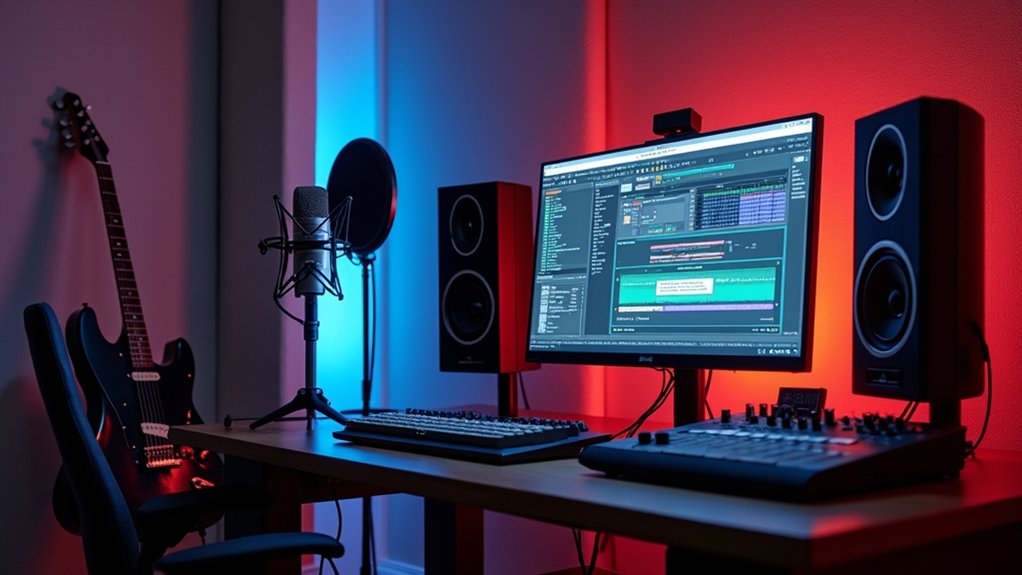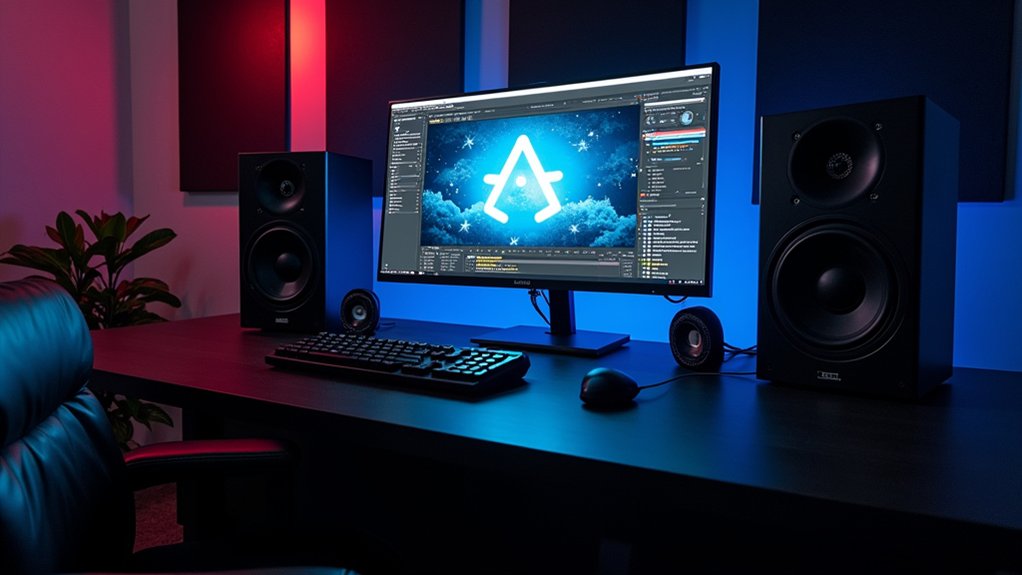The FL Studio Free Trial is generous, offering indefinite access to all core features and plugins—ideal for exploring its full capabilities. However, users cannot reopen saved projects, which limits actual workflow testing. Exporting complete tracks is possible, but long-term project development is restricted. Compared to other DAWs, its openness is unique, but the inability to resume work is a serious limitation. Exploring all considerations and strategies can help determine if it’s a good fit.
Key Takeaways
- The FL Studio Free Trial has no time limit, letting you explore all features for as long as you want.
- You get full access to core tools and all built-in plugins, mirroring paid versions’ capabilities.
- The main drawback is you can’t reopen saved projects, so you must finish or export work before closing.
- Export options include WAV, MP3, FLAC, MIDI, and video, allowing you to keep finished tracks.
- Technical support is unavailable with the free trial, so troubleshooting relies on community forums and self-help.
How Long Does the FL Studio Free Trial Last?
Unlike many digital audio workstations that impose strict time limits on their trial versions, the FL Studio Free Trial is unique in its indefinite duration.
FL Studio actually allows users to explore its full capabilities for as long as desired, offering an unrestricted timeframe to test the software. This perpetual trial period removes the pressure often associated with time-limited demos, letting potential buyers thoroughly evaluate FL Studio’s workflow and features at their own pace.
However, while the trial never expires, certain limitations exist—most significantly, users cannot re-open saved projects, and settings for trial plugins are not preserved between sessions.
Despite these restrictions, the unlimited trial period positions FL Studio as an attractive option for those seeking to assess a digital audio workstation without immediate purchase commitments.
What Features Are Available in the FL Studio Free Trial?
Building upon the indefinite trial duration, evaluating the breadth of features available in the FL Studio Free Trial reveals its extensive scope. The trial grants users unrestricted access to the entire range of functions found in paid versions, including advanced editing tools such as the piano roll, pattern editor, and playlist. Significantly, all built-in plugins are fully operational during the trial, allowing users to test the complete plugin suite without limitations. Export options are robust, supporting formats like WAV, MP3, FLAC, MIDI, and video, thereby catering to various production needs. Additionally, the trial supports loading third-party plugins, enhancing creative flexibility. However, a primary restriction is the inability to reopen saved projects, which may affect workflow continuity. Users can install plugins by downloading the plugin installer and using the Plugin Manager to rescan for new plugins, ensuring they are integrated effectively.
| Feature | Access Level | Limitation |
|---|---|---|
| Core Tools | Full | None |
| Built-in Plugins | Full | None |
| Export Formats | Full | None |
| Project Saving | Save Only | Cannot Reopen After Closing |
Which Plugins Can You Use During the Free Trial?
During the FL Studio Free Trial, users are granted unrestricted access to all native plugins, including prominent tools such as 3x Osc, Flex, Edison, and Slicex. This extensive access enables thorough evaluation of the software’s sound design and editing capabilities. However, limitations exist, as projects utilizing these plugins cannot be reopened without losing plugin settings, necessitating careful workflow management. Additionally, users can explore essential synth plugins like Helm by Matt Tytel, enhancing their sound palette during the trial.
Access to All Plugins
Nearly every plugin included with FL Studio becomes available to users in its free trial, providing unrestricted access to the full suite of instruments and effects bundled with the software. This approach allows users to thoroughly evaluate the plugins and features without initial purchase barriers.
The trial environment includes celebrated synths, samplers, and audio processors along with advanced creative tools. Significant plugins such as 3x Osc, Flex, and Edison are fully functional, along with specialized options like Harmless and Citrus. Users can experiment with sophisticated effects and explore the breadth of sound design possibilities.
- Full access to built-in instruments and effects
- Usability of advanced plugins like Newtone and Pitcher
- Capability to export songs using any available plugin
- Opportunity to assess a wide array of plugins and features
Trial Plugin Limitations
A thorough toolkit greets users in the FL Studio free trial, granting access to the full roster of built-in plugins and instruments for unrestricted evaluation. This enables users to test all standard features and native tools without limitation.
However, certain plugins not included in the base trial package load in trial mode. These trial plugins allow users to experiment with their features, but impose notable restrictions. Specifically, any project containing trial plugins cannot be reopened once saved, and plugin settings will reset upon reopening, which impacts long-term workflow and project continuity.
Despite these limitations, users can still export completed projects containing trial plugins to formats such as WAV, MP3, and MIDI. This export capability offers a practical workaround, allowing finished work to be preserved outside the FL Studio environment.
Can You Save and Reopen Projects in the Free Trial?
Curiously, despite offering full access to its features and plugins, the FL Studio Free Trial does not permit users to save and subsequently reopen their projects. This restriction stands as a significant limitation for those evaluating FL Studio’s capabilities.
While users can freely explore all tools and create complex arrangements, any session must be completed in one sitting. Once the software is closed, the project file becomes inaccessible, regardless of its progress or complexity.
Users receive a clear warning if they attempt to save projects containing trial plugins, underscoring the risk of data loss.
- Full access to FL Studio’s features during the trial
- Projects can be exported in multiple formats, but not reopened
- Saving is possible, but reopening is blocked after closing the software
- Users are advised to bounce MIDI to audio to preserve work
How Does the Free Trial Compare to Paid Versions?
While the inability to reopen saved projects in the FL Studio Free Trial stands out as a notable restriction, the trial otherwise mirrors the paid versions regarding feature access and plugin availability. The Free Trial grants users full access to all features and plugins found in any FL Edition, enabling thorough exploration of the software’s core capabilities. Users can load third-party plugins and export finished tracks in multiple formats, just as they would in a paid Edition. However, trial users do not receive technical support, unlike those with a paid license. Additionally, when upgrading from the Free Trial to a paid FL Edition, certain plugins change from trial mode to fully accessible status, further enhancing the user’s experience and workflow flexibility compared to the Free Trial environment. Moreover, FL Studio’s intuitive interface makes it appealing to novices, facilitating quick music creation with minimal prior knowledge required.
What Are the Main Limitations of the Free Trial?
The FL Studio free trial imposes notable restrictions, most prominently the inability to reopen saved projects, which can disrupt ongoing work.
Although all features and plugins are available during the trial, saved projects that use trial plugins cannot be reloaded, limiting workflow continuity.
Additionally, the absence of technical support requires users to resolve any software issues independently.
Project Saving Restrictions
Although FL Studio’s free trial grants access to all features and plugins, its most significant limitation is the inability to reopen saved projects. This restriction has a direct impact on users seeking to develop complex songs or iterate over time.
While users can create and export complete tracks, any saved project file cannot be reopened within the trial version. This project saving restriction is especially challenging for those requiring ongoing edits or collaboration.
The following points highlight the main concerns:
- Saved projects cannot be reopened in the free trial, making long-term work impractical.
- Any attempt to load projects with trial plugins will result in an unusable file and a warning message.
- Track count and input capabilities remain unrestricted, but project continuity is lost.
- No technical support is available during the trial.
Plugin Access Limitations
One notable aspect of the FL Studio Free Trial is its inclusion of access to all plugins, providing users with an opportunity to test the full breadth of the software’s creative tools.
However, plugin access limitations emerge when considering long-term workflow. While all plugins are available during the trial, any project using trial plugins cannot be reopened once saved, unless the software is purchased. This means users must export their work before closing, as plugin settings and configurations will be lost upon reopening.
Additionally, each time a project containing trial plugins is loaded, their settings reset, potentially disrupting creative momentum. These plugin access limitations, while allowing for initial exploration, may hinder users seeking to develop and maintain complex projects over multiple sessions within the trial environment.
No Technical Support
Maneuvering through the FL Studio Free Trial requires users to operate without access to official technical support, a notable limitation that distinguishes the trial from the full version. This absence means that any issues—whether related to the DAW’s video player, plugin errors, or workflow obstacles—must be resolved independently.
Beginners, in particular, may find it challenging to troubleshoot problems or optimize their setup without expert guidance. Users are instead directed to community forums, where advice may be inconsistent or incomplete. The lack of support can slow project progress and make complex tasks more intimidating.
- No direct help for video player or plugin-related issues
- Reliance on community forums for troubleshooting
- Steeper learning curve for beginners without guidance
- Potential workflow interruptions due to unresolved technical problems
Is Exporting Songs Possible With the Free Trial?
Curiously, exporting songs is fully supported in the FL Studio Free Trial, enabling users to save their creations in multiple formats such as WAV, MP3, FLAC, MIDI, and even Video. This capability allows individuals to test the full spectrum of FL Studio’s export options without any plugin restrictions, as all features are made available during the trial period. Users can create complete tracks, utilize the full suite of instruments and effects, and render their projects without limitations. However, the primary constraint is the inability to reopen saved project files, which can hinder iterative workflows. As a result, it is advisable for users to export all versions of their work—especially tracks using specific plugins—before the trial ends, ensuring compatibility and feature access if they later move to a paid version. To maximize export quality, users should consider setting up export settings like choosing the appropriate bit depth and activating the “Split mixer tracks” option for individual audio tracks.
Which Paid Versions of FL Studio Are Available?
FL Studio is available in four distinct paid versions: Fruity Edition, Producer Edition, Signature Bundle, and All Plugins Edition. Each tier offers features tailored to different user needs. The Fruity Edition, priced at $99, is the entry-level option but lacks audio recording and drag-and-drop audio support, limiting its utility for users requiring those capabilities. The Producer Edition, at $199, adds advanced plugins such as Edison and Slicex, making it a thorough starting point for beginners and intermediate users. The Signature Bundle, costing $299, includes additional plugins like Newtone and Pitcher, addressing more advanced production demands. The All Plugins Edition at $499 encompasses every available plugin, including future releases, and offers upgrade discounts based on previous purchases. For budget-conscious producers, it is important to consider the balance between cost and the features provided by each version when making a decision.
Tips for Getting the Most Out of the FL Studio Free Trial
After reviewing the range of paid FL Studio versions, it becomes clear that the free trial offers a rare opportunity to evaluate the software’s capabilities without immediate financial commitment. To maximize this period, users should thoroughly explore all available features and plugins, taking advantage of the unlimited trial duration. Experimenting with different workflows—such as creating and exporting songs in WAV, MP3, or MIDI—can reveal personal preferences. Importantly, because saved projects cannot be reopened, it is advisable to bounce MIDI tracks to audio for future use. Integrating third-party plugins further broadens creative options. Regularly consulting community resources and update notes can also streamline the learning process. Utilizing Neutron Pro’s mix assistant and spectral analyzer can significantly refine sound quality, transforming muddy mixes into clear tracks.
| Action | Benefit | Caution |
|---|---|---|
| Explore plugins | Broader sound palette | Can’t reopen saved projects |
| Export songs | Test workflow efficiency | Export before closing |
| Use third-party VSTs | Enhanced sound design | Check compatibility |
| Join communities | Gain tips/support | Verify reliable sources |
Is the FL Studio Free Trial Enough to Make a Decision?
To what extent does the FL Studio Free Trial equip a user to make an informed purchasing decision?
The TRIAL VERSION provides unrestricted access to all features and plugins, enabling users to thoroughly evaluate FL Studio’s interface, workflow, and compatibility with third-party plugins.
However, a key limitation is the inability to save and reopen projects, which may impede a thorough assessment for users focused on ongoing or complex productions.
While immediate creation and export are supported, long-term workflow testing is restricted. Users should weigh these factors carefully when considering a purchase.
A systematic approach to sound organization and management can enhance the creative workflow, which can be explored during the trial period.
- Full, unlimited feature access in the TRIAL VERSION
- Ability to test third-party plugin compatibility
- Exporting completed tracks is allowed
- Inability to reopen saved projects may hinder long-term evaluation
These factors collectively influence decision-making for potential buyers.
Frequently Asked Questions
Is FL Studio Free Trial Enough?
When evaluating if the FL Studio Free Trial is sufficient, the Trial Experience offers extensive feature access, export options, and plugin integration. However, the inability to reopen saved projects may restrict users seeking extended workflow or long-term project development.
Is FL Studio Good for Free?
Evaluating FL Studio as a free option, the Trial Experience delivers extensive access to all features and plugins without time limits. However, inability to reopen saved projects limits long-term use, making it ideal mainly for exploration and assessment.
What Are the Limitations of the FL Studio Trial?
Examining Trial Features, the FL Studio trial provides full plugin access and unlimited use, but restricts project reopening and saving. Projects with trial plugins may lose settings, and technical support is unavailable, potentially impacting troubleshooting or long-term workflow.
What Can You Do in FL Studio Free Trial?
The FL Studio Free Trial offers extensive trial features, including full access to all plugins, instruments, and exporting options. Users can create, mix, and export complete tracks while experimenting with third-party plugins, though project reopening is restricted.
Conclusion
In conclusion, the FL Studio free trial provides an extensive overview of the software’s capabilities, offering access to nearly all features and plugins. However, its limitation on saving and reopening projects may hinder long-term workflow testing. For users seeking to evaluate functionality, workflow, and compatibility, the trial proves valuable. Yet, a final purchasing decision may require considering the advantages of the paid versions, especially if seamless project management and full feature retention are essential for ongoing music production needs.




